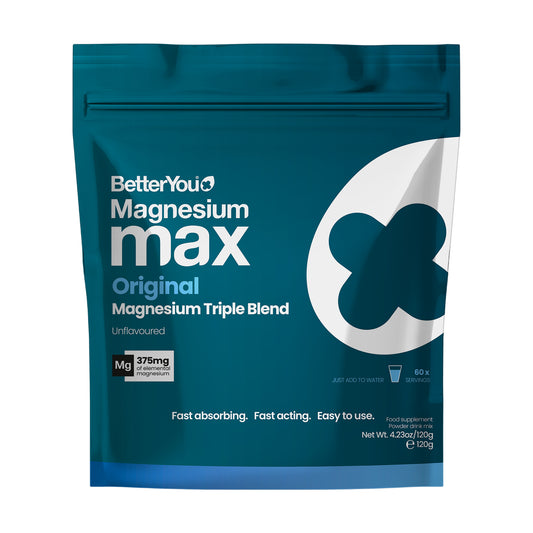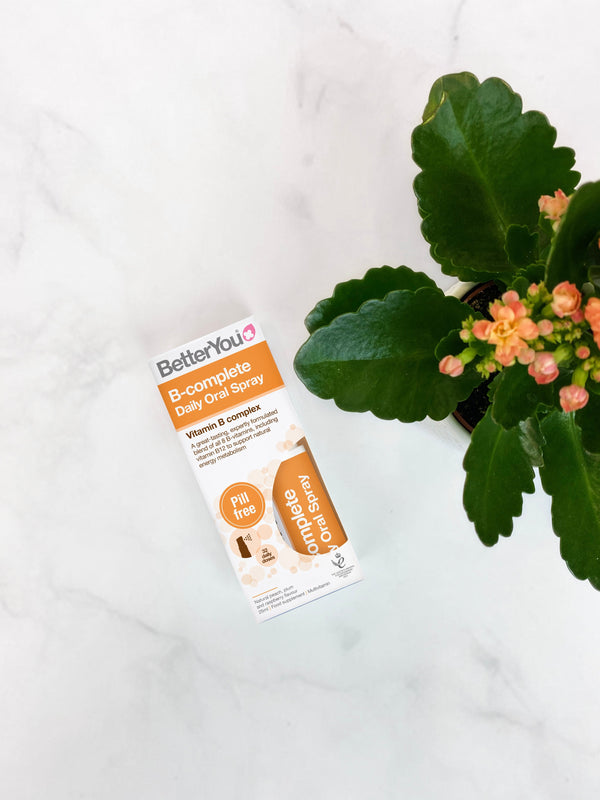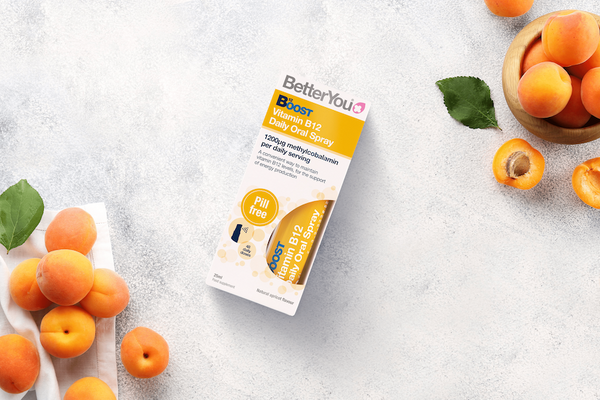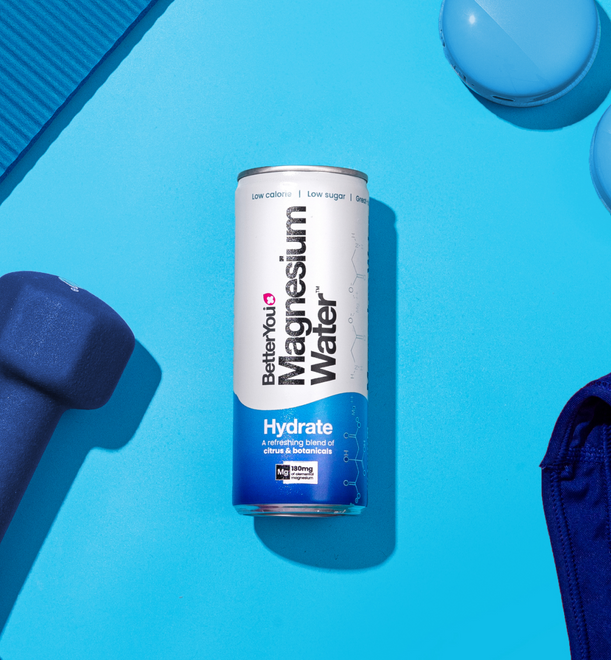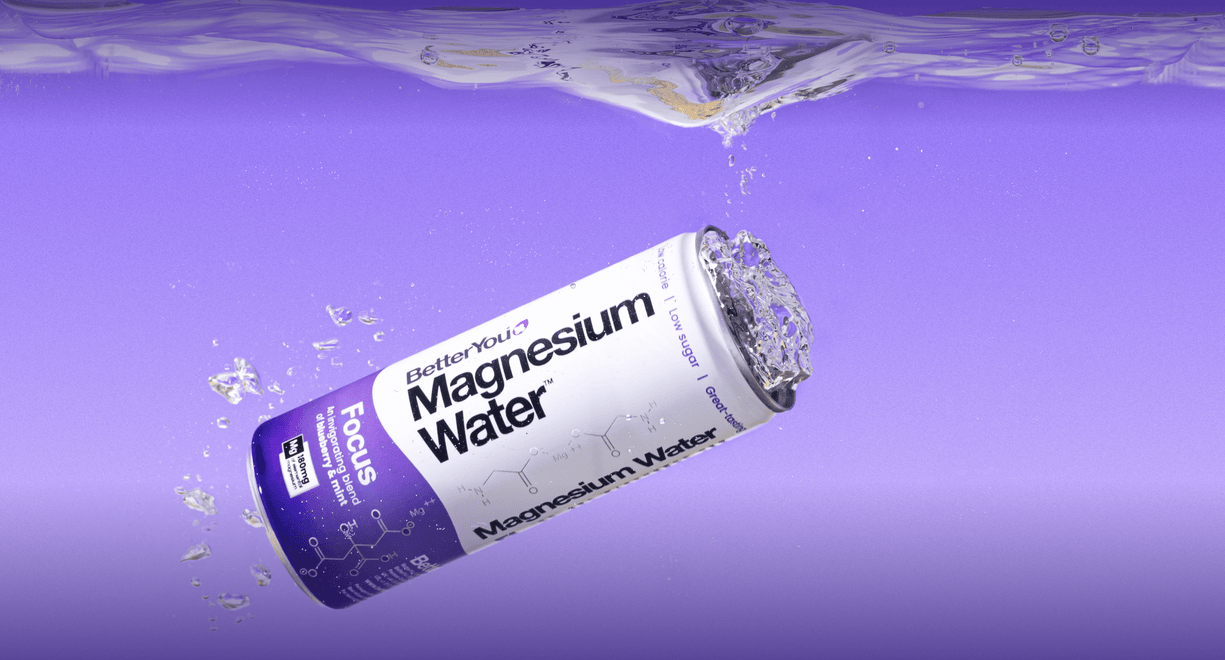Identifying vitamin B deficiency is important to ensure your body is working the way it should. This vitamin is important for many processes in the body, including nerve and brain function. Vitamin B is the umbrella term including the B complex vitamins. We’ve put together the ultimate guide to help you know the signs of vitamin B deficiency to look out for, and how to improve your intake.
Table of Contents:
- What is Vitamin B Deficiency?
- 3 Symptoms of Vitamin B Deficiency
- 4 Causes of Vitamin B Deficiency
- Are You at Risk of Vitamin B Deficiency?
- Ways To Increase Vitamin B Intake with BetterYou
What is Vitamin B Deficiency?
Vitamin B deficiency means your body is not getting enough of this vital vitamin for it to work effectively. The body needs a combination of vital nutrients in order to function at its best. Low amounts of this vitamin could affect your nerve and brain function, so it is important to know how to spot the signs of vitamin B deficiency.
The term ‘vitamin B’ actually includes the multiple types of vitamins that are in the B family. Though they are not chemically related, they are often all found in the same kind of foods. They are responsible for the workings of enzymes in the body so it is important to get the right amounts. Taking vitamin B supplements containing all types of B vitamins is a way to increase a wide intake of vitamins. The core B complex vitamins are:
- Thiamin (B1)
- Riboflavin (B2)
- Niacin (B3)
- Pantothenic acid
- Vitamin B6
- Biotin (B7)
- Folate and folic acid
- Vitamin B12
Vitamin B12 is the most commonly known of the B vitamins, because it is important for the brain, blood, and DNA. Spotting the signs of vitamin B deficiency is important to keeping these vital processes working properly.
3 Symptoms of Vitamin B Deficiency
Most deficiencies in this vitamin are very rare. The symptoms of each deficiency depend on which B vitamin you are deficient in. As vitamin B12 deficiency is the most common, the below signs and symptoms are for vitamin B12 deficiency. When someone is lacking this vital nutrient, the signs and symptoms can include:
- Tiredness and fatigue - In order to make red blood cells, the body needs vitamin B12 and iron. Without the right level of these nutrients, the body does not make enough red blood cells or makes misshapen ones. This means oxygen isn’t efficiently carried to the rest of the body. Without enough oxygen, the cells in the body cannot make enough ATP which gives you energy. Taking energy supplements can help to boost your energy levels by providing you with the right vitamins and minerals to produce ATP.
- Pale skin - Without enough of this vitamin, red blood cells produced in the bone marrow can become large and fragile. This makes them unable to pass into the circulation. The lack of red blood cells in vitamin B deficiency causes pale looking skin.
- Poor mood - Low levels can affect homocysteine and methionine which in turn can affect your mood. If you find you are in a low mood more often than usual, you may be experiencing it due to vitamin B deficiency.
If you think you are showing any of these signs of a vitamin B deficiency, you can easily test your symptoms with a blood spot test. BetterYou have a Vitamin B Test Kit to check your nutrient levels from the comfort of your own home. You will receive a personalised supplementation plan based on your results, and a complimentary supplement upon completion. With BetterYou, it’s easy to check if you are at risk of vitamin B deficiency.
4 Causes of Vitamin B Deficiency
Vitamin B deficiency is caused by not having enough of this vital nutrient in the body, and this can be caused by multiple factors. There are a range of causes of vitamin B deficiency which include:
- Insufficient dietary intake
- The inability to absorb it adequately
- A medical condition
- Pernicious anaemia - Pernicious anaemia is an autoimmune condition that affects your stomach and therefore your ability to absorb vitamins. This is the most common cause of vitamin B12 deficiency in the UK.
Are You at Risk of Vitamin B Deficiency?
Although anyone who does not intake enough of this vitamin can develop vitamin B deficiency, some people are more likely to be deficient than others. Those who are more at risk of vitamin B deficiency include:
- Pregnant people - The B vitamins play an important role in pregnancy and the development of your little one. That’s why it’s important that both parent and baby get enough vitamins. Taking pregnancy supplements can help to increase vital nutrient levels during pregnancy, whilst children’s vitamins can aid healthy growth.
- Those with digestive issues - People with issues such as Crohn’s disease, IBS, or celiac disease could be more at risk because these issues make it harder for the body to absorb nutrients. Taking vitamins in oral spray supplements that do not get absorbed through the digestive system can help those with digestive disorders.
- Vegetarians and vegans - Those with a restricted diet may find it hard to intake all the vital nutrients their body needs. This could lead to a vitamin deficiency. With vegetarian supplements and vegan supplements, those with more selective diets are able to support a more complete nutrient intake.
- Those over the age of 60 - As we age, the lining of the stomach loses its ability to produce stomach acid, which breaks down food to release vitamins to be absorbed. This means if you’re more advanced in age, you could be more at risk of developing a vitamin deficiency like vitamin B deficiency.
The people on this list could be at risk of developing vitamin B deficiency. Always seek medical advice from your GP if you think you may be at risk of vitamin B deficiency and before taking supplements.
Ways to Increase Vitamin B Intake with BetterYou
Not only can eating the right foods help to increase your nutrient intake, but choosing the best supplements can support sufficient levels. Taking supplements in addition to eating the right foods can help to aid a healthy lifestyle. With BetterYou supplements, like the Boost B12 Spray, you can support your body and the part this vital vitamin plays.
There are a number of ways to support nutrient intake and reduce your risk of vitamin B deficiency. Including foods rich in nutrients can help increase your levels. Foods sources which contain B vitamins include:
- Beef liver, and other organ meats
- Clams
- Meat, including fish and poultry
- Eggs
- Milk, cheese
- Fortified breakfast cereals
- Nutritional yeast
- Other fortified foods, including plant milks and flours
- Potatoes and other starchy vegetables
- Fruits, except for citrus fruits
- Legumes, including black beans and soybeans
- Nuts and seeds
- Green vegetables, including broccoli and spinach
According to the NHS, adults (aged 19 to 64) need about 1.5 micrograms a day of vitamin B12.
Pill-free supplements from BetterYou
Our range of vitamin oral sprays and topical magnesium supplements provide a fast, effective alternative to traditional tables and capsules. Scientifically formulated to deliver maximum nutrient absorption, with minimum fuss, to help you feel and live better.
Take control of your health today with our magnesium supplements to aid natural sleep, vitamin D supplements to boost your immunity and our at-home health checks to get a clear picture of your nutrient levels.
